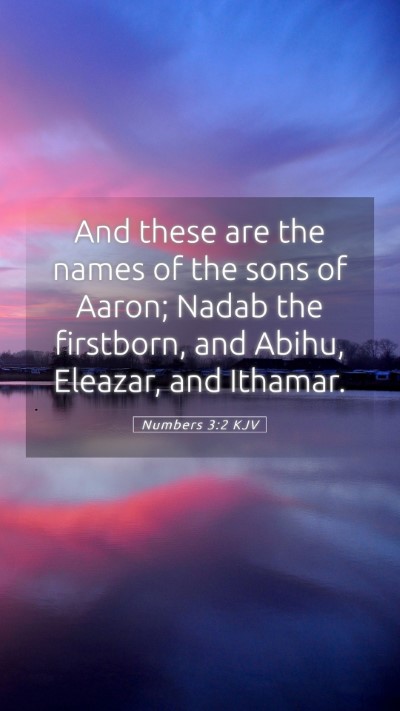Bible Verse Commentary: Numbers 3:2
Verse: “And these are the names of the sons of Aaron, Nadab and Abihu, Eleazar and Ithamar: these are the sons of Aaron.”
Overview
This verse introduces the names of Aaron's sons who are vital figures in the Levitical priesthood and sets the stage for subsequent discussions regarding their roles and responsibilities within the tabernacle service. The identification of these individuals aids in understanding their significance in the context of Israel's spiritual leadership.
Bible Verse Meaning and Interpretations
According to Matthew Henry, this verse marks an important moment in the establishment of the priesthood. Each name represents not just an individual, but a lineage that carries the responsibility of mediating between God and the people of Israel. The naming underscores the divine selection of Aaron and his sons for service in the tabernacle, implying a sacred calling.
Albert Barnes notes that the mention of Nadab and Abihu is crucial as their subsequent actions lead to significant consequences in later chapters. Their immediate identification serves as a foreshadowing of their disobedience, which had profound implications for worship and holiness in the priesthood.
Adam Clarke expands on their roles, indicating that Eleazar and Ithamar would later play pivotal parts in maintaining the order of worship and offerings. This highlights the structure within the priestly functions and illustrates the organization that God had for worship practices among His people.
Historical Context
Understanding this verse requires awareness of the cultural and historical context of ancient Israel. Aaron, as the elder brother of Moses, was chosen by God to serve as the first high priest. His sons represent the next generation entrusted with spiritual leadership. This verse not only names them but signifies their appointed status in a theocratic society governed by divine law.
Application to Daily Life
The significance of having appointed leaders can be reflected on in modern contexts as well. Just as Aaron’s sons were entrusted with spiritual duties, communities today benefit from dedicated leaders who guide and serve with integrity. Reflecting on this verse encourages individuals in positions of leadership to understand their roles as sacred trusts that demand accountability and commitment to God's standards.
Relevant Cross References
- Exodus 28:1 - God’s command to Moses regarding Aaron and his sons.
- Leviticus 10:1-2 - The incident involving Nadab and Abihu offering unauthorized fire.
- Hebrews 5:4 - Discussion on the priesthood, highlighting that no one takes this honor upon themselves.
Conclusion
This verse forms a crucial part of the narrative surrounding the Levitical priesthood. The names and legacy of Aaron’s sons provide insight into the expectations God had for spiritual leaders in Israel, offering a model that emphasizes both reverence and responsibility in serving the Lord. Through careful reflection and study, believers can derive deep insights into their understanding of Scripture, the importance of leadership in the community of faith, and the everlasting implications of serving God with integrity.


